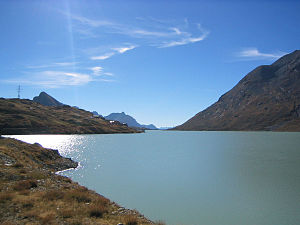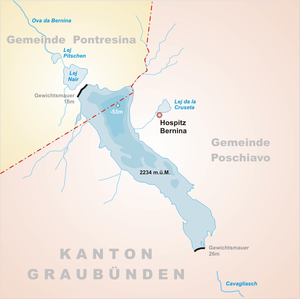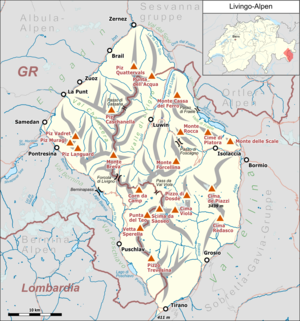Lago Bianco
| Lago Bianco | ||
|---|---|---|

|
||
| Lago Bianco | ||
| Geographical location | canton of Grisons | |
| Tributaries | various mountain streams | |
| Drain | Cavagliasch | |
| Data | ||
| Coordinates | 798 606 / 142 347 | |
|
|
||
| Altitude above sea level | 2234 m above sea level M. | |
| surface | 1.43 km² | |
| Maximum depth | 53 m | |
|
particularities |
two dams |
|

|
||
The Lago Bianco is a reservoir on the Bernina Pass between the Valposchiavo and the uppermost side valley of the Engadine , the Val Bernina , in Switzerland . It lies on the border between the Bernina (west) and Livigno Alps (east).
geography
There used to be two natural lakes in the area of today's reservoir: the larger Lago Bianco , which owes its name to the milky outflow of the Cambrena glacier, and the small Lago della Scala to the south . Several small mountain streams from the heights of the area flow into Lago Bianco, including the stream from the Lagalb alpine pasture , which owes its name to the lake. The water flowed from Lago Bianco through Lago della Scala and from there down through the Pila Gorge into the Cavagliaalp, where the Pilabach flows into the Cavagliasco River .
Immediately at the northern end of Lago Bianco lies the continental divide between the catchment areas of the Po and the Inn - Danube river system. A few dozen meters north of Lago Bianco lies Lago Nero on the upper reaches of the Bernina stream .
history
1910–1911 the two weight dams Scala (south side) and Arlas (north side, consisting of three arches) were built, so that a reservoir with a volume of 18.6 million m³ was formed.
The reservoir was initially drained naturally via the Acqua da Pila to the Puntalta water intake of the Robbia power plant . Since 1927 a pressure pipe has been supplying the water to the Palü power plant . 1941–1942, the two dam walls built in quarry stone with concrete crowns were raised by around 4 m. Because Lago Bianco is deepest in the northern part, a third wall and a pumping station were built in the lake so that the water intake located on the south wall can be supplied with water even when the water level is low (usually April to May). From July to October water is pumped up from the Palüsee into the Lago Bianco.
From 1999 to 2001, Rätia Energie, now Repower , completely renovated the two walls and re-sealed them on the lake side. The renovation of both walls was carried out by IsoPermaproof from Thusis .
Technical data of the dams
| Arlas (north) and Scala (south) | ||
|---|---|---|
| Completion: | 1912 | 1912 |
| Lock type: | Gravity dam | Gravity dam |
| Crown length: | 280 m | 190 m |
| Height: | 15 m | 26 m |
| Lock volume: | 7000 m³ | 13,000 m³ |
| Catchment area: | 10.85 km² | |
| Storage volume: | 18.6 million m³ | |
| Surface: | 143 hectares | |
| Length: | 3 km | |
| Capacity: | 80 m³ / s | |
| Repower , Brusio | ||
Expansion of pump storage
Repower plans to connect the Lago Bianco (approx. 2230 m above sea level) with the Lago di Poschiavo (approx. 960 m above sea level) via an 18.1 km long pressure tunnel and a 2.4 km long pressure shaft to create a pumped storage power plant with 6 machine groups of 175 MW each, a total of 1050 MW. The capacity of Lago Bianco is to be expanded from 18 to 26 million m³ by increasing the dam wall. The investment is estimated at 2.5 billion Swiss francs and the construction time is expected to be 6–7 years. Since the daily price fluctuations in the electricity market have been decreasing for several years (as of 2015), economic viability is currently in question and it remains to be seen whether and when the building decision will be made.
gallery
Web links
- Lago Bianco on the ETHorama platform
- Lago Bianco on schweizersee.ch
- Information board of the eco-electricity path (PDF file; 8.16 MB)


